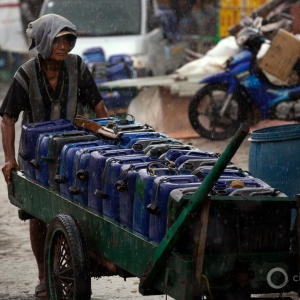Fresh, March 21, 2023: Chicago Residents and Activists File Suit Against Toxic Sediment Dumping Grounds
March 21, 2023
Fresh is a biweekly newsletter from Circle of Blue that unpacks the biggest international, state, and local policy news stories facing the Great Lakes region today. Sign up for Fresh: A Great Lakes Policy Briefing, straight to your inbox, every other Tuesday.
— Christian Thorsberg, Interim Fresh Editor
This Week’s Watersheds
- Residents and activists on Chicago’s Southeast Side are suing the U.S. Army Corps of Engineers over a plan to expand toxic sediment dumping grounds.
- Over $150 million in President Biden’s proposed 2024 budget would fund dredging projects and flood mitigation studies throughout Michigan.
- A land conservancy and a township in Michigan’s Upper Peninsula purchased four miles of riparian habitat for the purpose of land, water, and biodiversity conservation.
- One of Mackinac Island’s ferries will be converted to zero-emissions electric power for the first time ever.
Ahead of President Biden’s visit to Ottawa, American lawmakers are urging him to press Canadian policymakers for more support on Great Lakes protection and projects.
“We appreciate your support of the Great Lakes and encourage you to emphasize the importance of our binational institutions and investments for the Great Lakes from the Canadian government.” — Excerpt from a letter to President Biden from a bipartisan group of Great Lakes lawmakers.
Members of the House Great Lakes Task Force, a bipartisan group of U.S. representatives from New York, Michigan, Ohio, Illinois, Indiana, Minnesota, Pennsylvania, and Wisconsin, signed a letter asking President Biden to advocate for more Canadian support in Great Lakes-related projects when he visits Ottawa later this week, the Detroit News reports.
The U.S. lawmakers stressed that “sustained partnerships” are needed to combat shared challenges, including algal blooms, invasive species, and habitat restoration. According to Detroit News, over the past five years, the U.S. Congress has allocated between $300 million and $548 million per year for Great Lakes efforts; over the same time, Canada committed a total of $33 million.
Fresh from the Great Lakes News Collaborative
- Multi-million dollar restoration projects proposed for the Saginaw Bay watershed; paid with settlement money from corporate polluters — Michigan Radio
- EPA seeks lower PFAS drinking water standard: What it means for Michigan — Bridge Michigan
- Environmental justice expert questions Michigan’s subsidies for electric vehicles — Great Lakes Now
The Great Lakes News Collaborative includes Bridge Michigan; Circle of Blue; Great Lakes Now at Detroit Public Television; and Michigan Radio, Michigan’s NPR News Leader. We work together to produce news and information about the impact of climate change, pollution, and aging infrastructure on the Great Lakes and drinking water. This independent journalism is supported by the Charles Stewart Mott Foundation. Find all the work here.
On Chicago’s Southeast Side, a Lawsuit to Protect Residents and Nature
SEDIMENT LAWSUIT: Environmental activists on Chicago’s Southeast Side are suing the U.S. Army Corps of Engineers for violating both the National Environmental Policy Act and Clean Water Act in a proposed expansion of a lakefront sediment dumping site.
The site comprises 43 acres and borders Lake Michigan, the mouth of the Calumet River, and Calumet Park, a popular green space where the city’s South Chicago and East Side neighborhoods converge. Currently the disposal facility, which has reached capacity, “stores sediment dredged from the river and five other federally maintained waterways in the city,” according to Block Club Chicago.
Residents and activist organizations say that the decision to expand was made without properly considering environmental and human health impacts of increasing the amount of toxic sediment, and that the neighborhood is tired of being the city’s dumping grounds. Critics also say that the expansion conflicts with an earlier promise to return the facility to the Chicago Park District once it reaches capacity, to then be used as open land.
The neighborhood is no stranger to environmental efforts. In 2021, residents went on hunger strikes while successfully stopping a large metal scrapper facility from being moved to the area from the city’s north side.
In the News
STURGEON RIVER: Over four miles of waterfront property along the Sturgeon River in Dickinson County, Michigan, will be protected by the Superior Watershed Partnership and Land Conservancy, the Mining Journal reports. The $2.1 million purchase, coordinated with Waucedah Township, is part of the organization’s larger goal of conserving 30 percent of Michigan’s land, water, and biodiversity by 2030. Included in the purchase were nearly 1,000 acres of adjacent forest, an area that is home to 40 species of plants and animals listed as either threatened, endangered, or of special concern.
MACKINAC ISLAND: A $3 million grant from the Michigan Department of Environment, Great Lakes, and Energy will fund a Mackinac Island passenger ferry’s conversion to zero-emissions electric power. According to the state of Michigan, the conversion will reduce “greenhouse gas emissions by 14,152 metric tons of carbon dioxide equivalents and 887 metric tons of nitrogen oxides over the boat’s lifetime.” The grant is funded by a $64 million settlement the state received from Volkswagen after the car company was found to be cheating its emissions tests.
Looking Ahead
BUDGET PROPOSAL: President Biden’s $6.8 trillion proposed budget for the 2024 fiscal year includes $157 million for the U.S. Army Corps of Engineers Detroit District, which maintains and operates dozens of projects on the Great Lakes, according to Michigan Live.
Some of the funding would be put toward the Great Lakes Coastal Resiliency Study, which plans to identify communities in and around Buffalo, Detroit, and Chicago that are at risk of flooding, and provide these areas with preventative planning measures and non-structural assistance. Funding would also support at least three other flood risk management studies near Michigan rivers, while 14 harbors in the state would be dredged.
Meanwhile the majority of the money — $107.7 million — would support the next phase of the Soo Locks reconstruction project.
Upcoming Events
March 21 – 24 — The Great Lakes Fishery Commission: Upper Lakes Committee Meeting — learn more
March 22 — Freshwater Science: Understanding and (Potentially) Mitigating the Impacts of Tile Drainage — register
March 28 – 30 — The Great Lakes Fishery Commission: Lower Lakes Committee Meeting — learn more
Other News
COPI: In an effort to eradicate copi, an invasive species of fish found in the Great Lakes, a growing movement seeks to rebrand it as an “underrated, affordable, and eco-friendly protein rather than a pest,” Wired reports. Copi is the new name for Asian carp.
PFAS REGULATION: Water treatment facilities around the country are bracing for new, potentially more expensive testing and treatment methods as the EPA proposed first-ever standards on PFAS in drinking water, WTVG Toledo reports.
Christian Thorsberg is an environmental writer from Chicago. He is passionate about climate and cultural phenomena that often appear slow or invisible, and he examines these themes in his journalism, poetry, and fiction.









Leave a Reply
Want to join the discussion?Feel free to contribute!